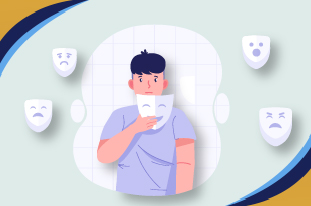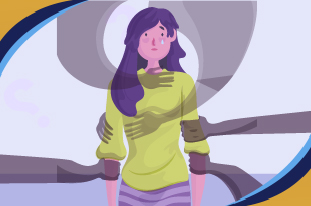Moodiness is a hallmark of the childhood and teenage years. Even children are bound to show some moodiness from time to time. But what if it is long-lasting and persistent in the way it shows its symptoms in children? If that is the case, then your child is probably suffering from Disruptive Mood Dysregulation Disorder (DMDD). Let’s discuss its main features and how disruptive it exactly is in the words below after we go through the basics of this disruptive mood disorder first. In the end, you will know much more:
Defining Disruptive Mood Dysregulation Disorder (DMDD)
Disruptive mood dysregulation disorder (DMDD) is a type of mental condition in children and adolescents that is defined by persistent and recurrent symptoms of moodiness that usually convert into tantrums even when the reasoning behind them is not that big of a deal. The intensity of these symptoms is so high that they interfere with affected children’s ability to lead a normal life. The onset of this mental condition tends to be at the age of 10, usually. The name comes from how a child is not able to regulate his or her emotions properly when affected by mood dysregulation disorder.
While children and adolescents between the ages of 6 and 18 are diagnosed with disruptive mood dysregulation disorder symptoms, they are more commonly seen in children between the ages of 6 and 10. Additionally, to receive a diagnosis, the child cannot be younger than 6 or older than 18.
Read More: What’s The Difference Between A Mood Disorder And A Personality Disorder?
DMDD symptoms
These are the DMDD symptoms that the affected children experience when these begin around the age of 10:
- Symptoms that have been present for at least a year
- Three or more instances of major temper tantrums a week on average
- Anger and irritation with intervals of tantrums
- Uncontrollable and extreme emotions
Disruptive mood dysregulation disorder symptoms such as the above tend to intensify if it is left untreated for a long time.
What causes DMDD?
As with all mental conditions in existence, and also considering the relative newness(1) of this type of mental condition can make it difficult to ascertain what causes DMDD. It comes into existence due to a range of different factors such as family history or a complex combination of biological, genetic, and environmental factors.
The Relationship Between Oppositional Defiant Disorder (ODD), Bipolar Disorder and Disruptive Mood Dysregulation Disorder (DMDD)
Similar to dysregulated mood disorder, oppositional defiant disorder (ODD) is a behavioral condition in which your child displays a persistent pattern of uncooperative, defiant, and sometimes hostile behavior toward people in authority. The only difference between these two is that DMDD is more severe and dare we say much more intensified when comparing the DMDD symptoms and the ODD symptoms. It can be a cause of confusion for both the patients and their mental health practitioners. So, when a child is diagnosed with ODD and DMDD, it is diagnosed as a disruptive mood dysregulation disorder to avoid any confusion.

DMDD can also be a cause of confusion when it comes to bipolar disorder as both are highly debilitating and are defined by extreme changes in mood. DMDD symptoms tend to be more chronic and have a continuing streak, which means it’s ongoing while bipolar is episodic. Bipolar is a lifelong condition and on the other hand, DMDD evolves into either major depressive disorder or generalized anxiety disorder. In addition to that, bipolar tends to be a disorder more prevalent in adults rather than children or adolescents, which is where disruptive mood dysregulation disorder is more present.
What is the Difference Between Typical and Severe Irritability (DMDD)?
Experiencing severe irritability (as observed in DMDD) is essentially having difficulty tolerating frustration and having outbursts that are out of proportion. For example, a parent tells the child to chew his or her food properly. Now that child might be frustrated or annoyed but someone with DMDD may become extremely upset and emotional. They may also have an intense temper outburst with yelling or hitting things.
Read More: Understanding ADHD Mood Swings: A Journey Through Emotional Waves
What is the Research Saying About Disruptive Mood Dysregulation Disorder
Research is steadfast in finding the thresholds associated with a condition like disruptive mood dysregulation disorder to uncover more about it(3). Studies are also bent on considering and trying to find out if all stakeholders, especially mental health practitioners can solve the problem of or entirely avoid misdiagnosis of this relatively new condition(2). Early research showed that it may affect around 2% to 5% of children in the U.S.
Disruptive Mood Dysregulation Disorder Treatment
Current studies are more biased toward resolving the main symptoms that are present in similar mental conditions such as anxiety and ADHD: irritability. These treatments, though, do work for the DMDD too.
Let’s start with Psychotherapy
Psychotherapy is the umbrella term for different types of therapies that focus on identifying and changing unhealthy emotions, thoughts, and behaviors of the affected individuals with some type of mental health expert in attendance who paves the way for therapy’s goal by talking to those affected ones.
There are two types of psychotherapies suitable for children suffering from Disruptive Mood Dysregulation Disorder:
Cognitive Behavioral Therapy (CBT)
This way your child will try to understand how their negative feelings are affecting their actions. CBT tries to resolve the problems with DMDD by motivating your child to unlearn negative thoughts and behaviors, which are learned through adopting healthier thinking patterns and habits.
Dialectical behavior therapy (DBT)
DBT is an evolved form of CBT, which teaches your child to regulate their emotions and avoid extreme or prolonged outbursts as it’s specially adapted for people who experience emotions very intensely.
Medication
While the USA’s Food and Drug Administration (FDA) hasn’t passed DMDD’s medication for approval yet, psychiatrists can still prescribe medications to help manage DMDD symptoms, including but limited to:
Stimulants
These are traditionally used for treating attention-deficit/hyperactivity disorder (ADHD). Stimulants are used to induce increased activity of the central nervous system. Research suggests that stimulant medications can help in decreasing irritability in children with DMDD.
Antidepressants
These are medications like Selective Serotonin Reuptake Inhibitors, which include increased production of neurotransmitters like serotonin and norepinephrine, which are associated with symptoms like irritability, something that is prevalent in disruptive mood dysregulation disorder. It can specifically be combined with methylphenidate (a stimulant) and can decrease irritability in children with DMDD.
Antipsychotic medication
These can be sometimes prescribed to treat children with irritability, severe outbursts, or aggression. These are only used when all other treatment approaches fail.
Read More: Everything about Emotional Dysregulation in ADHD
Conclusion
As we have told you before, you will know much more about Disruptive Mood Dysregulation Disorder. You also know the DDMD symptoms and its treatment. If treatment is what you want then look no further than Orange Coast Psychiatry which does not only help in treating DMDD but is also capable of treating mental ailments like MDD, Acute stress, or PMM with additional treatment options like telehealth psychiatry.
References and Footnotes
- American Psychiatric Association. Diagnostic and Statistical Manual of Mental Disorders. 5th ed. Washington, DC: American Psychiatric Association; 2013.
https://psycnet.apa.org/record/2013-14907-000 - Margulies DM, Weintraub S, Basile J, Grover PJ, Carlson GA. Will disruptive mood dysregulation disorder reduce false diagnosis of bipolar disorder in children? Bipolar Disord. 2012 Aug;14(5):488-96. doi: 10.1111/j.1399-5618.2012.01029.x. Epub 2012 Jun 19. PMID: 22713098.
https://pubmed.ncbi.nlm.nih.gov/22713098/ - Laporte PP, Matijasevich A, Munhoz TN, Santos IS, Barros AJD, Pine DS, Rohde LA, Leibenluft E, Salum GA. Disruptive Mood Dysregulation Disorder: Symptomatic and Syndromic Thresholds and Diagnostic Operationalization. J Am Acad Child Adolesc Psychiatry. 2021 Feb;60(2):286-295. doi: 10.1016/j.jaac.2019.12.008. Epub 2020 Jan 29. Erratum in: J Am Acad Child Adolesc Psychiatry. 2021 Jun;60(6):789. doi: 10.1016/j.jaac.2021.03.013. PMID: 32004697; PMCID: PMC9073144.
https://pubmed.ncbi.nlm.nih.gov/32004697/
























